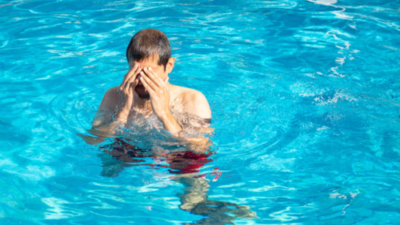- News
- lifestyle
- health-fitness
- health-news
- Can someone be allergic to water? The answer is surprising
Trending
Can someone be allergic to water? The answer is surprising
Aquagenic urticaria, also known as water allergy, is a rare condition where exposure to water triggers allergic reactions like hives. Symptoms can include itchy welts, systemic reactions, and impact daily activities.

Sounds bizarre, right? Is there a health condition where an individual is allergic to water? The answer is yes!
Water allergy, also known as aquagenic urticaria, is an extremely rare condition where exposure to water triggers hives or other allergic reactions. Despite water being essential for life, this condition causes individuals to experience severe discomfort and potentially debilitating symptoms when they come into contact with it.
Aquagenic urticaria is a form of physical urticaria, where physical stimuli such as pressure, temperature, or sunlight provoke the symptoms.In this case, water is the trigger, regardless of its temperature. This can include rain, sweat, tears, or even the patient's own saliva.
How to know if you are allergic to water?
Symptoms can appear within minutes of contact with water and typically resolve within 30 to 60 minutes after drying off. In more severe cases, exposure to water can lead to systemic symptoms such as headache, wheezing, difficulty breathing, or swelling in areas like the lips and throat. These reactions can significantly impact the quality of life, making routine activities such as bathing, swimming, or even being out in the rain, challenging and distressing.
Living with aquagenic urticaria
Living with aquagenic urticaria requires a proactive approach to avoid triggers and manage symptoms. Here are some practical strategies:
The psychological impact of aquagenic urticaria can be significant, as the condition can lead to anxiety, depression, and social isolation. Coping with a rare and poorly understood condition can be challenging. Patients might benefit from counseling or joining support groups where they can share experiences and strategies for managing daily life.
Is there a cure for water allergy?
There is no cure for aquagenic urticaria, but several treatments can help manage symptoms. Antihistamines are commonly used to reduce the histamine response and alleviate itching and swelling. In some cases, additional medications such as corticosteroids, leukotriene inhibitors, or phototherapy may be recommended. Preventive measures include applying barrier creams to protect the skin before exposure to water or using lukewarm water instead of hot or cold, which might help reduce symptoms.
Water allergy, also known as aquagenic urticaria, is an extremely rare condition where exposure to water triggers hives or other allergic reactions. Despite water being essential for life, this condition causes individuals to experience severe discomfort and potentially debilitating symptoms when they come into contact with it.
Aquagenic urticaria is a form of physical urticaria, where physical stimuli such as pressure, temperature, or sunlight provoke the symptoms.In this case, water is the trigger, regardless of its temperature. This can include rain, sweat, tears, or even the patient's own saliva.
How to know if you are allergic to water?
The primary symptom of aquagenic urticaria is the rapid development of itchy hives or welts on the skin after exposure to water. These hives are usually small, red, and resemble those caused by other allergic reactions.
Heart failure in men and women: Understanding the differences in symptoms
Symptoms can appear within minutes of contact with water and typically resolve within 30 to 60 minutes after drying off. In more severe cases, exposure to water can lead to systemic symptoms such as headache, wheezing, difficulty breathing, or swelling in areas like the lips and throat. These reactions can significantly impact the quality of life, making routine activities such as bathing, swimming, or even being out in the rain, challenging and distressing.
Living with aquagenic urticaria
- Skin care: Regularly moisturizing the skin with hypoallergenic lotions can create a protective barrier.
- Protective gear: Wearing waterproof clothing or using umbrellas can help minimize exposure to rain or other water sources.
- Alternative cleaning methods: Using water-free cleansing methods, like no-rinse body wipes, can help maintain hygiene without triggering symptoms.
Hydration : Drinking water usually doesn’t cause symptoms, but it’s essential to monitor and consult a healthcare provider if any issues arise.
Is there a cure for water allergy?
End of Article
FOLLOW US ON SOCIAL MEDIA









